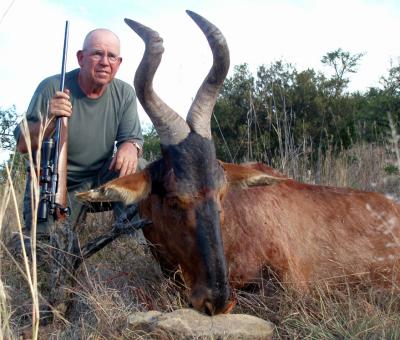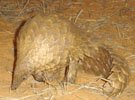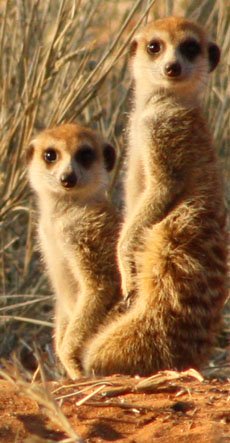For more information about our hunting safaris, don’t hesitate to reach out and contact us!
Hartebeest are "hard to bust"
by Terry Blauwkamp
(Hudsonville MI USA)
My most recent experiences were no different.
It started out with us glassing several small herds of Hartebeest (HB), and each time we set up for a stalk or a shot, something would bugger us up. The wind would shift, or they just decide to move in a different direction than we thought they would.
I had one group that we stalked and set up for a shot 7 times, before we actually were able to get one.
It was in quite thick brush, and no matter what we did, it was wrong. I finally had to crawl on my belly and find a spot to shoot under a branch as I could then just see his chest that way. There was no way to shoot sitting or standing off the sticks.
A most memorable hunt was for a beautiful bull we spotted about noon one day, and we watched them for over an hour as they worked into a little canyon and were just standing around. Two of the cows actually bedded down. This was sure to keep the bulls close, so we planned our stalk.
We went up and around them so that we could come down the valley from above, and have a good view all the way.
Finally we got to 162 yards and set up. I was sitting on a rock with my right arm resting on my PH’s shoulder, and the shooting sticks under my rifle, for almost a bench rest type shot.
All the HB had to do was take two more steps, and he would be in a perfect position for the shot.
Now guess what happened... He turns around a couple times, and beds down all by himself. The cows were up feeding and he just beds down behind a bush.
We can see only his horns, and we can see he is very sleepy, as the horns would slowly go down, and suddenly pop back up like he is trying to stay awake.
We sat there for 2 hours and twelve minutes and my butt was really beginning to ache! That rock had no padding on it. My PH’s shoulder was going to sleep, as he was not moving either.
It was now getting quite late in the day, and he said we had two choices: "Make it happen", or "Wish we had".
So he took a small pebble or stone and threw it down at the HB trying to get his attention, and make him stand up. To stand up would be great, but he still had to move into a clear spot for a shot.
After about 10 stones being tossed at him, the HB finally stood up, and looks around trying to figure out what that disturbance is.
Then we were blessed as he walked right into a clearing to have a better look. At this point my 180 gr Swift A-Frame bullet was introduced to his boiler room, and he collapsed at the shot.
Whoa! Were we happy to get him as our butts had enough of this! We quickly went down to him to get some pictures before it got any darker.
They may be tough to get, but these are the hunts that are the most memorable - that's for sure!
Terry Blauwkamp
Comments for Hartebeest are "hard to bust"
|
||
|
||
|
||
Meaning of "Uitspan"
'Uitspan' is an Afrikaans word that means place of rest.
When the Boer settlers moved inland in Southern Africa in the 1800's, they used ox carts. When they found a spot with game, water and green grass, they arranged their ox carts into a circular laager for protection against wild animals and stopped for a rest.
They referred to such an action of relaxation for man and beast, as Uitspan.
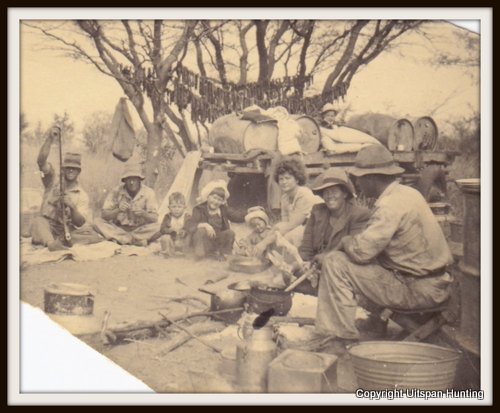
(Picture above of our ancestors.)
Did you know?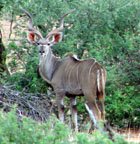 Greater Southern Kudus are famous for their ability to jump high fences. A 2 m (6.56 ft) fence is easily jumped while a 3 m (9.84 ft) high fence is jumped spontaneously. These strong jumpers are known to jump up to 3.5 m (11.48 ft) under stress. |
Did you know? Some animals have one sense more than man!The flehmen response is a particular type of curling of the upper lip in ungulates, felids and many other mammals. This action facilitates the transfer of pheromones and other scents into the vomeronasal organ, also called the Jacobson's Organ. Some animals have one sense more than man!The flehmen response is a particular type of curling of the upper lip in ungulates, felids and many other mammals. This action facilitates the transfer of pheromones and other scents into the vomeronasal organ, also called the Jacobson's Organ.This behavior allows animals to detect scents (for example from urine) of other members of their species or clues to the presence of prey. Flehming allows the animals to determine several factors, including the presence or absence of estrus, the physiological state of the animal, and how long ago the animal passed by. This particular response is recognizable in males when smelling the urine of a females in heat. |
